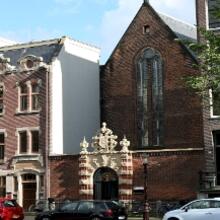PhD Defense Farrokh Labib
On 26 January 2022 at 10:00, Farrokh Labib (CWI) will defend his PhD Thesis titled 'Quasirandomness in quantum information theory'. Farrokh's PhD supervisor is Prof. H.M. Buhrman, the co-supervisor is Dr J. Briët.
The defense will take place at the Agnietenkapel, in Amsterdam.
Abstract
We study quasirandomness in several contexts in quantum information theory. Roughly speaking, an object is quasirandom if it shares properties with a random object. What these properties are, depends on the context.
Consider, for example, uniformly random 3-regular graphs. They have the property that they are likely highly connected, while at the same time the number of edges is quite small (the graph is "sparse''). Highly connected refers to the property that, for example, a random walk on the graph mixes very rapidly: after a small number of steps, the position of the walker is close to uniformly random. So when an explicit 3-regular graph has this property as well, we say that it is quasirandom.
Among other things, interesting objects whose quasirandomness we study in this dissertation are linear maps from matrices to matrices or complex-valued functions on a finite abelian group. These objects appear in quantum information theory in the form of quantum channels or the amplitudes of quantum states for example.
For quantum channels, we study the equivalence of certain quasirandom properties: we generalize the theory of quasirandom graphs to quantum information theory showing that “expansion” and “uniformity” are equivalent for “dense” and “very symmetric” quantum channels.
For quantum states we consider the notion of rank, where you want to express a quantum state in terms of a minimal number of simpler states called stabilizer states, this is the stabilizer rank. In this case, random quantum states have “high” stabilizer rank and we want to know if an explicit quantum state, say the magic state, has high stabilizer rank. Here we shed light on this problem by looking at this problem from a different perspective, through the lens of higher-order Fourier analysis.
You can read the thesis here.

